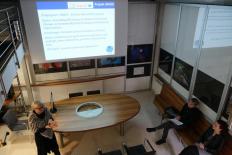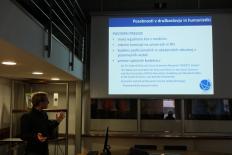GRACE
Principal Investigator at ZRC SAZU
Mimi Urbanc, PhD-
Original Title
Grounding RRI Actions to Achieve Institutional Changes in European Research Funding and Performing Organisations
-
Acronym
GRACE
Project Team
Mimi Urbanc, PhD, Helena Dobrovoljc, PhD, Assoc. Prof., Jelica Šumič Riha, PhD, Rok Benčin, PhD, Urška Vranjek Ošlak, PhD, Špela Ledinek Lozej, PhD-
ARIS Project ID
824521
-
Duration
1 January 2020–31 December 2021 -
Lead Partner
-
Project Leader
dr. Maria Ildiko Ipolyi
-
Financial Source
Horizon2020 – Program 'Znanost z in za družbo'
Partners
Znanstvenoraziskovalni center Slovenske akademije znanosti in umetnosti (ZRC SA…, Swedish Environmental Research Institute (IVL), Švedska, University of Siena (UNISI), Italija, University of Groningen (RUG), Nizozemska, The European Network of Science Centres and Museums (ECSITE), Belgija, Knowledge and Innovation (K&I), Italija, Aarhus University (AU), Danska, South East European Research Centre (SEERC), Grčija, Agency for Management of University and Research Grants (AGAUR), Španija
GRACE (Grounding RRI Actions to Achieve Institutional Changes in European Research Funding and Performing Organisations) is a "Science with and for Society" H2020 funded project that supports the European Commission's objective of spreading and embedding Responsible Research and Innovation (RRI) in the European Research Area.
GRACE's mission is to develop a set of specific Grounding Actions in six performing and funding organisations (Implementing Organisations). These actions will be the basis for the development of a tailored 8-year RRI Roadmap within these organisations to ensure its sustainability and full implementation over the long-term.
1st Event
Discussion on the ZRC SAZU Policy Framework on Research Ethics and Integrity 1
February 5th 2020
2nd Event
Science – Between Research Ethics and Plagiarism
November 12th 2020
Presentations:
- GRACE project presentation, Ildiko Ipoly
- Research Ethics and Scientific Integrity, Ron Iphofen
- Plagiarism: Definition and Detection, Debora Weber-Wulff
- Workshop: How to avoid plagiarism and the most common mistakes in scientific work?, Milan Ojsteršek
3rd Event
Discussion on the ZRC SAZU Policy Framework on Research Ethics and Integrity 2
November 19th 2020
Presentation of research ethics and integrity issues at ZRC SAZU, Rok Benčin
4th Event
Opportunities for Public Engagement in the Linguistic Research Process
November 16th 2021
- PREPARATORY PHASE a. Self-analysis. The six implementing organisations (it may also be a research group, a university department, or the whole institution) are asked to reconsider their culture and practices in the light of their present orientation toward RRI. b. They should identify the critical issues they are facing. They may pertain to, for example, organisational issues (lack of time, procedures, work organisation, task distribution, etc.,), staff-related issues (retaining young researchers, increasing the number of permanent positions, managing internal conflicts, etc.), economic issues (reducing costs, accessing new funds and resources, etc.), research-related issues (improving the research quality, accessing better equipment, attracting talents, etc.), relations with external players (policymakers, funding agencies, developers, local authorities, private firms, etc.). c. Developing a self-tailored profile of RRI. In the third step, the RFPOs should develop a self-tailored profile of RRI, i.e., an idea or vision of RRI based on the previous two steps. The key issue here is that of understanding the added value of RRI (as a general policy framework) and of the RRI key areas. Compiling an inventory and analysis of RRI-related activities (often not labelled as RRI-oriented actions) the RFPOs have already in place to be used as "starting points" to move from is also an important step. d. Designing the grounding actions. In the fourth step, the RFPOs should develop a coordinated set of RRI-oriented actions aimed at "grounding" RRI in their culture and practices. The grounding actions will be SMART (Specific, Measurable, Achievable, Realistic, Time-bound) and should be aimed at attaining well-defined institutional changes which, in turn, are expected to be connected to specific RRI indicators. The GAs will be included and integrated in the 8-year Institutional Change Roadmap.
- DEVELOPMENTAND MUTUAL LEARNING PHASE. This step is aimed at implementing the grounding actions, integrating them in each implementing institution into a consistent Roadmap toward RRI and permanently embedding them through institutional arrangements of any type (new rules, new practices, new organisational units or functions, new cooperation agreements, etc.).
- STOCKTAKING PHASE. The final step to be conducted during the project implementation will be that of assessing the institutional changes attained, ensuring their sustainability after the project lifespan, revising the objectives established for the post-project period, and revising the six Roadmaps toward RRI to be implemented in the next five years. The revision of the Roadmap will consider all the different aspects necessary for generating long-term impacts from the planned GAs, including securing funds and resources, a precise engagement on the part of the organisation's management, a reliable and realistic time plan and an organisational unit or an officer responsible for their appropriate implementation.

